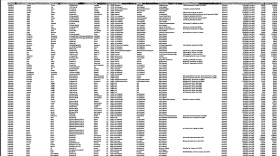Harvard Professor Lawrence Lessig became the latest candidate to enter the Democratic side of the 2016 presidential campaign today. Unlike other candidates in the race, he is running on a single issue: getting big money out of politics.
Lessig announced his campaign to a modest crowd of about thirty people in Claremont Wednesday. The location was a symbolic choice. It was in Claremont that then-President Bill Clinton and then-Speaker of the House Newt Gingrich agreed, in 1995, to tackle the issue of campaign finance reform once and for all. The bipartisan deal never materialized, and the issue now defines Lessig’s campaign. Speaking yesterday, he said all other policy concerns must wait until campaign finance reform is achieved.
“I don’t care what your issue is," Lessig explained. "You might be someone who cares about two or three issues – doesn’t matter. Every one of these issues depends on solving this fundamental issue first. And once we solve it, I think it’s possible to imagine dealing with those issues.”

This single-minded focus is not the only distinguishing feature of Lessig’s campaign. Perhaps the most unusual plank in his platform is his promise to resign shortly after winning the White House. That is, after he enacts the reforms to reduce the influence of money in politics. Lessig said, if successful in that effort, he’ll step aside and let the vice president take over.
Joe Magruder, a Democratic voter from Concord who came to see Lessig yesterday, says he used to be cynical about the influence of money in politics. Then he saw Lessig speak a few years ago.
“The key thing he persuaded me of is that we aren’t getting anything done," said Magruder. "From wherever you are on the political spectrum, we aren’t getting anything done while all of Congress is so dependent on money.”
Lessig’s campaign announcement comes at a time when other presidential candidates have been speaking more about the influence of money in politics. Earlier this week, Democrat Hillary Clinton released a plan that included a constitutional amendment to limit the influence of wealthy campaign donors. Democratic Sen. Bernie Sanders often talks about the political influence of the “billionaire class” in his stump speeches. And on the Republican side, Donald Trump has become an unlikely advocate for running a campaign free from the influence of big donors.
Dan Weeks is executive director of Open Democracy, one of a number of advocacy groups working to get money out of politics. For him, these developments are all welcome news.
“We are thrilled," said Weeks. "Honestly, if you go back six or 12 months, it was hard to imagine any of the candidates making this a central issue of their campaign.”

Lessig faces significant hurdles to winning the Democratic nomination including a lack of broad name recognition and a field of other candidates who are talking about the same issue. But even with others in the race speaking about the corrupting influence of money in elections, Lessig says his campaign is needed, even if he doesn’t win the nomination.
“I will be happy for whatever good I can do for the issue," Lessig said. "But because I believe that we urgently have to solve this problem, I’m not going to be happy if we don’t solve this problem in 2017.”
Whether Lessig will be the candidate to deliver that solution remains to be seen.








